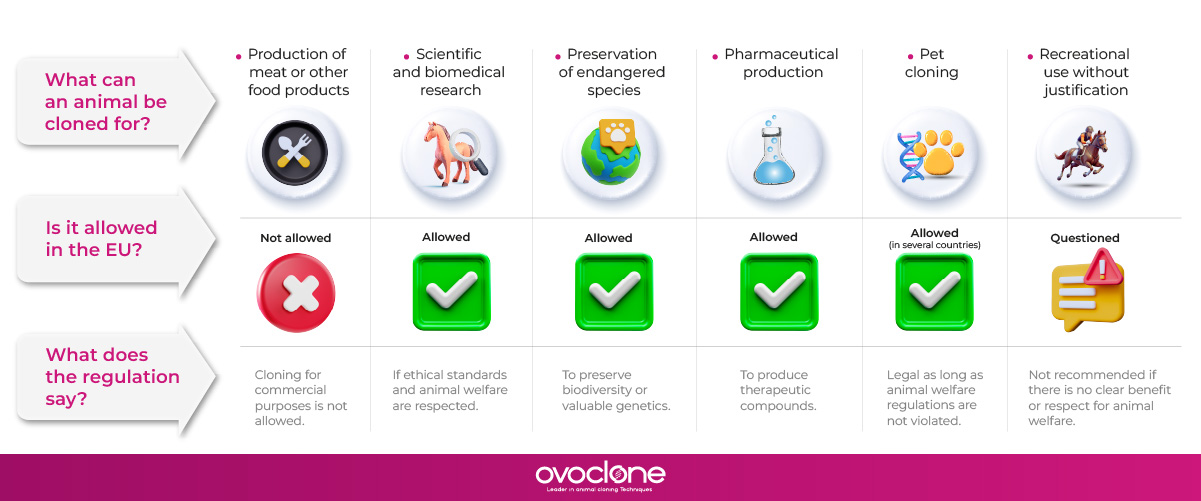Since the famous Dolly the sheep was cloned in July 1996, animal replication has gone from science fiction to reality. However, almost 30 years later, many people still think that this practice is not legal. But did you know that in Europe, animal cloning is not banned in all cases?
While it is true that there are important restrictions, European legislation allows animal cloning under certain conditions, as its applications are more beneficial than people imagine. In this article, we will debunk all the myths surrounding the practice and tell you what European law actually says.
EU makes it clear: cloning yes, but with conditions
By cloning we mean the biotechnological process of creating genetically identical copies of an existing animal, using techniques such as nuclear transfer. As mentioned above, this form of assisted reproduction has been in use since the birth of the first mammal using these techniques, Dolly the sheep.
Since then, the European Union has dealt with animal cloning mainly in the context of animal husbandry and food production, distinguishing these uses from other scientific or medical purposes. Depending on the purpose of the cloning, it is either prohibited or permitted.
What does the European Union prohibit?
The European Union has been developing and updating regulations and legislation on animal cloning within its territory. In general, there is a restrictive position for commercial and food purposes, but a more permissive position for research or conservation purposes.
Since 2010, the European Commission has proposed a temporary suspension of these activities for food production purposes. Ethical concerns led the European Commission in 2013 to adopt legislative proposals to ban the use of the cloning technique in farm animals, the import of these clones and the marketing of food derived from clones. This includes meat or milk from cloned animals.
These measures sought to address animal welfare concerns and ethical objections from European consumers. However, specific European legislative initiatives were not adopted due to lack of final agreement in the Council. However, a political moratorium remains in place: no cloning for farming purposes in the EU and no import of clones or their embryos for farming purposes.
Therefore, until specific legislation is in place, food derived from cloned animals is considered ‘novel food’ under Regulation (EC) 258/1997 (now replaced by Regulation (EU) 2015/2283), which means that any food product from clones would require a safety assessment and prior authorisation by the European Food Safety Authority (EFSA) before being placed on the market.
Additionally, the new organic production regulation expressly prohibits the use of cloning in organic animal husbandry (EU Regulation 2018/848) which reinforces the exclusion of this technique at least in the field of organic livestock farming.

What does the European Union allow in animal cloning?
The European Union allows the use of pet cloning, cloning for scientific research and the cloning or preservation of endangered species, as well as the use of these practices to produce medicines or medical devices.
The only premise is to comply with the general animal welfare standards and ethical framework. Therefore, cloning animals for non-food purposes is not prohibited.
Myths and misinformation about animal cloning
It is curious that despite being a normalised practice for almost 30 years, there are still myths and misinformation that distort the reality surrounding animal cloning.
This biotechnological tool has fundamental applications for animal survival. For example, would you like to see extinct animals such as dinosaurs brought back to life, or would you like the concept of “endangered” animals to cease to exist? All these answers have only one orientation, science.
Recently, it was the dire wolf that came to life again. Icon of the prehistoric megafauna, it dominated the Americas during the Pleistocene. Extinct for more than 12,000 years, this legendary predator (you may remember it from series such as “Game of Thrones”) has once again captured the world’s attention thanks to an unprecedented biotechnological milestone: its partial de-extinction.
Through a combination of CRISPR, cloning and synthetic biology, scientists have succeeded in recreating a living organism that carries key genes from the dire wolf. An unprecedented breakthrough that reaffirms the importance of science in the field of animal cloning and its applicability in order to bring major value to the world. It is now, and has been for many years, legal in Europe.
So is its use to clone man’s best and inseparable friend, the pet. In most European countries, this practice is completely legal, in compliance with animal welfare regulations, as it is guaranteed that no animal suffers in these practices.
However, many citizens still believe that cloning an animal is forbidden or that it is a science fiction fantasy. Quite the opposite is true. The reality is that it is legally, technically and emotionally feasible, and that there are already real cases – more and more frequently – of people who have returned to enjoy their pet with the DNA of the one they loved so much.
The only drawback that still separates this practice from a daily and widespread use by all citizens is its high cost, as the cloning of pets such as dogs or cats is currently around 55,000 euros.
Is cloning legal in Spain? The answer is clear, YES. In the words of legal experts, cloning a pet in Spain is neither a crime nor is it expressly forbidden, and it falls into a legal vacuum subject to the applicable animal health and welfare regulations. Therefore, companies such as Ovoclone offer this opportunity to all those who wish to have their beloved pet back.
Conclusion
Animal cloning, in Spain and Europe, is not a forbidden field, but a field full of opportunities and possibilities that is governed by very clear ethical rules. Today, thanks to the progress of science, it is possible to help, preserve and even heal without the need for controversy or moral conflicts.

